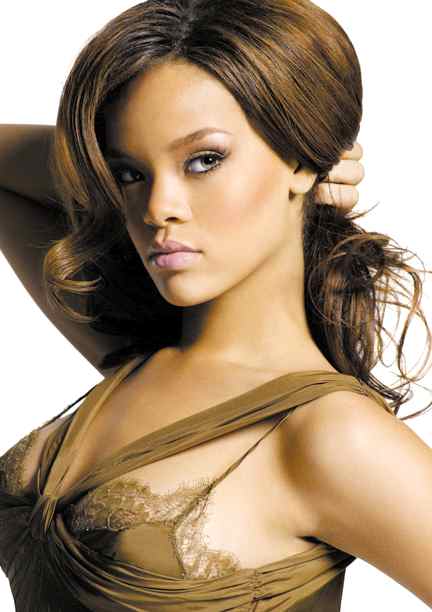 I've already written about most of the Hollywood sex symbols of the pre-Code era—Jean Harlow, Joan Blondell, Marlene Dietrich, or if you prefer, Norma Shearer, Greta Garbo and Clara Bow. But before I put the era in this blog's rearview mirror, I should stop briefly to mention perhaps the most famous sex symbol of the age, Mae West.
I've already written about most of the Hollywood sex symbols of the pre-Code era—Jean Harlow, Joan Blondell, Marlene Dietrich, or if you prefer, Norma Shearer, Greta Garbo and Clara Bow. But before I put the era in this blog's rearview mirror, I should stop briefly to mention perhaps the most famous sex symbol of the age, Mae West.Now let's be honest: although I nominated her for a Katie Award for her work in I'm No Angel, Mae West really doesn't work for me, not as an actress, not as a comedienne and certainly not as an object of fantasy. She took the role of sex goddess and dialed it up to "11," beyond vamp, beyond burlesque, more like a drag queen, except, you know, less subtle. Mae West played so broadly, with the leer and the voice and the double entendres, that ultimately she became completely sexless, a threat to no one.
 But maybe that's how she got away with it.
But maybe that's how she got away with it.Born on August 17, 1893, in Brooklyn, New York, Mary Jane West started performing at the age of five and was a regular on the vaudeville circuit by the age of fourteen. In 1926, she had her first starring role on Broadway in a show she wrote herself, the subtly named Sex. The show sold over three hundred thousand tickets during its run but also resulted in a morals charge that landed West in the workhouse for eight days (with two days off for good behavior). The resulting publicity—she told reporters she wore silk underwear in prison—made her nationally famous.
West wrote other plays, but it was 1928's Diamond Lil that proved to be the turning point in her career. Set in the Bowery during the Gay Nineties, Diamond Lil is the story of a barroom singer who battles white slavers on the one hand and the Salvation Army on the other. Broadway audiences loved it and although she was already pushing forty—ancient for a budding Hollywood actress—Paramount Pictures signed her to a movie contract.
 Hollywood's censors prevented West from filming Diamond Lil as written, and instead, a watered-down version was released as She Done Him Wrong, co-starring Cary Grant and boasting the oft-misquoted line, "Why don't you come up some time and see me?"
Hollywood's censors prevented West from filming Diamond Lil as written, and instead, a watered-down version was released as She Done Him Wrong, co-starring Cary Grant and boasting the oft-misquoted line, "Why don't you come up some time and see me?"She Done Him Wrong was nominated for an Academy Award as best picture of 1932-33 and in 1996, the Library of Congress included it in the National Film Registry.
 If you're going to see only one Mae West movie, I would suggest I'm No Angel, the follow up to She Done Him Wrong. Again co-starring Cary Grant, here Mae West plays a circus performer who gyrates for the (as she puts it) "suckers," but as with all of her movies, the story is irrelevant. You're paying to see Mae West play Mae West and she does it better here than anywhere else, singing such numbers as "They Call Me Sister Honky-Tonk," spouting double entendres and, unusual for the times, hamming it up with a Greek chorus of African-American actresses who function as her only true friends and confidants.
If you're going to see only one Mae West movie, I would suggest I'm No Angel, the follow up to She Done Him Wrong. Again co-starring Cary Grant, here Mae West plays a circus performer who gyrates for the (as she puts it) "suckers," but as with all of her movies, the story is irrelevant. You're paying to see Mae West play Mae West and she does it better here than anywhere else, singing such numbers as "They Call Me Sister Honky-Tonk," spouting double entendres and, unusual for the times, hamming it up with a Greek chorus of African-American actresses who function as her only true friends and confidants.West's films go rapidly downhill after Hollywood's studios began enforcing the Production Code in mid-1934—not much point to a Mae West movie without the innuendo. The best of the bunch is probably My Little Chickadee, a 1940 pairing with W.C. Fields. In 1978, she made her last movie, Sextette, a cinematic disaster that put the bomb in bombshell.
 West was married twice, but had her longest relationship with Paul Novak, her live-in partner from 1954 until her death in 1980. He was thirty years her junior.
West was married twice, but had her longest relationship with Paul Novak, her live-in partner from 1954 until her death in 1980. He was thirty years her junior.Among her better-known quips:
 "It's not the men in your life that counts, it's the life in your men."
"It's not the men in your life that counts, it's the life in your men.""When I'm good, I'm very good. But, when I'm bad, I'm better."
"A hard man is good to find."
"Too much of a good thing can be wonderful."
[To a policeman in 1936] "Is that a pistol in your pocket or are you just glad to see me?"
"Never let one man worry your mind. Find 'em, fool 'em and forget 'em!"
"When women go wrong, men go right after them."
"Marriage is a great institution, but I'm not ready for an institution."













